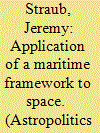| Srl | Item |
| 1 |
ID:
137413


|
|
|
|
|
| Summary/Abstract |
This article considers how Klein’s argument for the use of a maritime framework for space warfare is buoyed by the consideration of deep space conflict both in application to terrestrial wars and in its own right. It describes the greater alignment of Corbett’s work with this deep space medium than with the orbital medium considered by Klein. Through this analysis, it suggests that possible futures need to consider the deep space medium, making Corbett/Klein’s model superior to other possible approaches.
|
|
|
|
|
|
|
|
|
|
|
|
|
|
|
|
| 2 |
ID:
138227


|
|
|
|
|
| Summary/Abstract |
Advocates of space solar power propose its use as a mechanism for solving terrestrial and orbital power problems. These craft collect solar radiation via their solar panels and transmit it in a more concentrated form to receiving spacecraft or ground stations. This more concentrated transmission (e.g., via laser or microwave radiation) alters the power generation equation for the receiving craft or station, as it allows smaller (both in terms of mass and volume) receiving hardware to be utilized. It also offers other prospective benefits, such as the possibility of receiving power in eclipse and the reduced deterioration rate of radio antennas, as compared to solar cells (removing the need to include extra generation capability to offset lifetime deterioration). This paper seeks to answer the question of whether the use of SSP to power other in-space craft is justified, from an economic perspective. It considers factors that can be assessed both quantitatively and qualitatively.
|
|
|
|
|
|
|
|
|
|
|
|
|
|
|
|
| 3 |
ID:
152391


|
|
|
|
|
| Summary/Abstract |
The availability of low-cost, high-performance miniaturized electronics, and rocket ride-share capabilities and other factors, have generated a significant increase in the development of small spacecraft. Over a hundred entities and thousands of individuals are now working on numerous small satellites. However, these entities and individuals lack the operations legacy and risk posture of existing satellite manufacturers. Although these new entrants have much less to lose, small satellites may be in a position to damage other, more expensive spacecraft, including manned spacecraft. This article considers the need for and benefits of a community-generated set of small spacecraft operating standards. A prospective pathway to their refinement and adoption, specific elements in such a set of standards, the increased confidence this provides larger operators, and the additional opportunities advanced by standards are discussed.
|
|
|
|
|
|
|
|
|
|
|
|
|
|
|
|